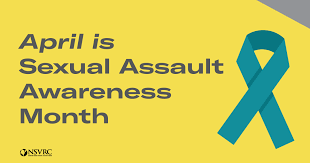Written by Student Health Advocate, Azucena Morales Santos

Introduction
Sexual assault or assault of any kind can occur to anyone. I understand that sexual assault is a sensitive topic that may be triggering to some, and I want to make space to acknowledge and respect those feelings. Still, I believe it is important to talk about these topics so that it is not taboo or something shameful to talk about. In this blog post, I will talk about what sexual assault is and share my experience. I will discuss ways to be an ally for survivors of sexual assault.
What is sexual assault?
Using the nationwide anti-sexual violence organization: Rape, Abuse & Incest National Network (RAINN), sexual assault is referred to as forced sexual contact or behavior. It is important to emphasize that this means consent was not explicitly given. There are many forms of sexual assault that include but are not limited to rape, unwanted sexual touching, and forced to perform sexual acts. Additionally, force does always mean physical force, it can also be being peer pressured or threatened to perform sexual acts.
Before I continue, I acknowledge and want to stress that this is not an exhaustive list of descriptions of sexual assault.
My experience
I personally have not experienced sexual assault. Conversations about sexual assault were not really discussed in my family. I didn’t learn the term sexual assault until I was in a school setting. Even though I learned the term, back then, I felt it was something that I would learn once and never be mentioned again. How naive I was. Throughout my high school experience, I began to learn stories from peers who had experienced sexual assault. I was shocked, scared, and I didn’t know what to do when my peers shared their stories. I questioned: What can I do? How can I be an ally? How can I help?
My suggestions of how to be an ally
Listen:
One of the most important things to do when someone is sharing something vulnerable is to listen. It seems so simple but sometimes we can forget the strong impact being heard can do.
Don’t attempt to ‘fix’ them:
One of the first instincts I had when my peer shared their story was to somehow make them feel better. To fix them because I thought they were broken. Don’t do this. They are not broken nor do they need fixing. Instead, offer them help, ask “is there anything I can do to help?” they may reply with no, that’s okay. Some don’t need help, sometimes listening is enough.
Reassurance:
In my opinion, I think it is important to reaffirm their experience by telling them that you appreciate and value their shared experience. That you believe what they’ve gone through and that you support them.
Some phrases:
-
Thank you for trusting me and sharing your experience.
-
I don’t know what to say, but thank you for trusting me with this.
-
I don’t know how to respond, but I’m here for you, and always will be.
-
I cannot empathize with how you’re feeling, but all I know is that I want to support you in any way that you feel I can.
Provide resources:
Sharing resources can be one way of supporting your peer. It is important to remind yourself that you don’t know how they feel unless you ask directly. You may want to ask about their boundaries and ways that you can support.
Some phrases:
-
Hey, about the other day, I want to show you some resources. It’s okay if you feel you don’t need them. I just want to let you know that they are available and accessible
-
Hey, I did some searching, and I found some resources, I don’t know if you know about them… if this makes you uncomfortable, I will stop. I want to make sure I’m respecting your feelings.
Closing
Supporting a peer who has experienced sexual assault may be challenging because we may not know what to do. Still, remind yourself that the focus is not on you but them. How can we support them? How can I ensure I’m not saying the wrong things to them? I hope this small blog can help guide you in answering your questions. Regardless whether you know some who has experienced sexual assault or not, learn about the cause, the movements, and listent to survivors. Be aware, learn, share information. You can potentially change someone’s perspective and change their lives.
Here are resources for survivors: we are here for you.
-
https://www.rainn.org/: has a live chat available and phone number to call for confidential crisis support. Confidential means your identity will be known and kept private.
-
800.656.HOPE (4673) is the National Sexual Assault hotline that is available 24/7
-
Immigrant survivors: National Immigrant Women’s Advocacy Project
-
Latine survivors: National Latin@ Network
-
Black survivors: Ujima
-
Asian, Native Hawaiian and Pacific Islander Survivors: Asian Pacific Institute on Gender-Based Violence
-
LGBTQ Survivors of Color: National Queer and Trans Therapists of Color Network
-
Male survivors: Malesurvivor.org
*sources were taken from RAINN’s website. For more information about the resource go to:https://www.rainn.org/national-resources-sexual-assault-survivors-and-their-loved-ones
Here are some resources to learn about sexual assault.
https://www.rainn.org/articles/sexual-assault: what is sexual assault? (both in English & Spanish)
https://www.womenshealth.gov/relationships-and-safety/sexual-assault-and-rape/sexual-assault: What is sexual assault?
https://apps.rainn.org/policy/?&_ga=2.141388786.1946253774.1616962653-77516742.1616962653#report-generator: learn about laws regarding consent and Sex crimes in your state
References: https://www.rainn.org/
Graphics: https://www.nsvrc.org/saam/2021/saamgraphics

